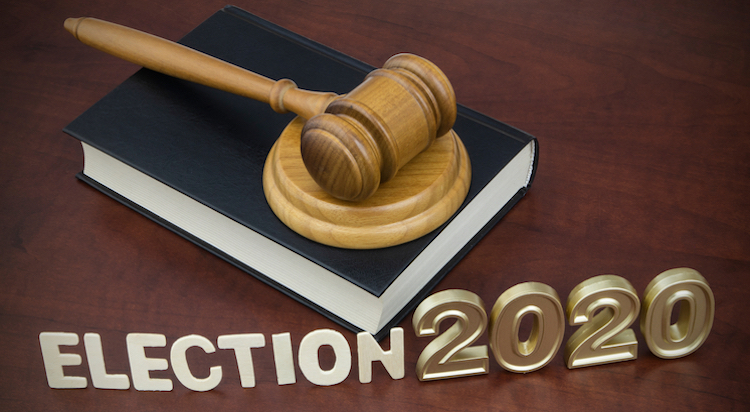Exasperated judges question Trump lawyers on election claims, leading to one 'nonzero' admission

Image from Shutterstock.com.
Lawyers representing President Donald Trump's campaign and the GOP are facing some close questioning by exasperated judges trying to pin them down on claims of election irregularities.
The result: Lawyers repeatedly have been rebuked by judges for their arguments, the Washington Post reports.
In one of the most-cited examples, U.S. District Judge Paul Diamond of Philadelphia questioned campaign lawyer Jerome Marcus about claims that GOP observers weren’t allowed to watch the ballot count in Philadelphia. CNN had covered the hearing.
Under questioning, Marcus conceded there were “a nonzero number of people in the room.”
“I’m sorry, then what’s your problem?” Diamond responded.
The Post cites another example involving lawyer Jonathan Goldstein, who was representing the Trump campaign in a lawsuit seeking the exclusion of nearly 600 mail-in ballots in Montgomery County, Pennsylvania, for deficiencies. Newsweek had coverage.
The judge told Goldstein he read the petition, and asked him to confirm he isn’t claiming any fraud. Goldstein replied: “Your Honor, accusing people of fraud is a pretty big step. And it is rare that I call somebody a liar, and I am not calling the Board of the [Democratic National Committee] or anybody else involved in this a liar. Everybody is coming to this with good faith. The DNC is coming with good faith. We’re all just trying to get an election done. We think these were a mistake, but we think they are a fatal mistake, and these ballots ought not be counted.”
The judge replied: “I am asking you a specific question, and I am looking for a specific answer. Are you claiming that there is any fraud in connection with these 592 disputed ballots?”
“To my knowledge at present, no,” Goldstein replied.
The judge pressed on. “Are you claiming that there is any undue or improper influence upon the elector with respect to these 592 ballots?”
“To my knowledge at present, no,” Goldstein replied.
A third example cited by the Post involves the Trump campaign’s bid to stop counting some ballots in Detroit, based on a GOP poll watcher who said she was told by an unidentified person that some late-arriving ballots were being backdated to before Election Day so they could be counted. The Detroit Free Press and MLive.com had coverage here and here.
Judge Cynthia Stephens said the information was hearsay, but lawyer Thor Hearne argued to the contrary. He pointed to a sticky note received by the poll watcher that said, “Entered receive date as 11/2/20 on 11/4/20.”
“So I want to make sure I understand you. The affiant is not the person who had knowledge of this. Is that correct?” Stephens asked.
“The affiant had direct firsthand knowledge of the communication with the elections inspector and the document they provided them,” Hearne replied.
“OK, which is generally known as hearsay, right?” the judge responded.
“I would not think that’s hearsay, Your Honor,” Hearne said. “That’s firsthand personal knowledge by the affiant of what she physically observed. And we included an exhibit which is a physical copy of the note that she was provided.”
The judge later issued a decision calling the argument “inadmissible hearsay within hearsay.”
“The common thread running through all of these,” the Post said, “is that Trump’s lawyers are regularly offering a significantly more watered-down version of Trump’s claims about rampant voter fraud—because they, unlike Trump, have to substantiate their claims. And as these exchanges show, it’s a rather thankless task that can quickly land them on a judge’s bad side.”
The Associated Press is keeping track of the litigation. At least 17 election lawsuits have been filed by the Trump campaign and allies. The “barrage of lawsuits” has not come close to proving issues that would call into question the election of Joe Biden, the story says.
Write a letter to the editor, share a story tip or update, or report an error.


